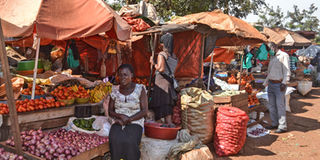How Amber Court Market thrived during lockdown

Traders display foodstuff for sale at Amber Court Market in Jinja City. PHOTO | DENIS EDEMA
BY PHILIP WAFULA
Every morning, from around 4am several traders from almost every corner of Jinja City, with reed baskets perched on their heads, brave the coldness as they head to town.
The traders, mainly women, walk from as far as Bugembe in Jinja District and Mbiko, Njeru Municipality in Buikwe District.
They all end up at Amber Court Market, home to more than 2,000 traders dealing in mainly foodstuffs and strategically located near the roundabout that one negotiates as they enter Jinja City.
Widely looked at as Busoga Sub-region’s food basket, the market attracts traders from as far as Kampala, Mukono, Iganga and Mbale, among other destinations, all because of the cheap prices of foodstuffs, the lockdown notwithstanding.
Mr Moses Olupot, a boda boda rider, on Wednesday described the market as a “farmers’ market”, adding that those selling non-consumables, including clothes are “misplaced”.
Mr Olupot, who frequently ferries traders’ merchandise from Amber Court to other markets, some as far as Lugazi in Buikwe District, said: “When the lockdown had just started, things were very expensive. I remember a kilogramme of maize flour was going for Shs3,000. But while there was a general scarcity of raw cassava, it was sold here at Shs80,000 per sack.
“I remember buying a sack (of cassava) for a trader in Mukono who told me he was going to sell the same sack at Shs170,000,” Mr Olupot said.
Mr Olupot is, however, baffled by the market’s ‘night’ operations. “By 5am, I ferry over five passengers who tell me to pick them up before 7am,” he said.
Until two weeks ago, Ms Mary Mutesi, who sells fried cassava on Main Street in Jinja City, was buying her raw cassava from Jinja Central Market; but after realising that she wasn’t recouping any profits, she shifted to Amber Court Market and accordingly, has started earning off her business.
Most of the foodstuffs come from Bugerere (paw paws), Mbale (onions and greens), Buvuma (bogoya and cassava) and Budondo (sweet potatoes, spinach, eggplants), Kibibi-Butagaya (spinach and greens), oranges from Budaka and charcoal from Kamuli, says Mr Matia Basalirwa, a boda boda rider.
“The market does not only serve Busoga because I see traders coming from as far as Kampala to buy produce; and in times of scarcity, Kampala-based traders enter the market as early as 1am and sweep it clean, leaving the inhabitants empty-handed,” Mr Basalirwa added.
The chairperson of the market, Mr Ayub Kitamilike, said the market is unique because its a distribution centre for food to other markets. He added that his management is still battling with the business community in implementing Covid-19 guidelines.
Ms Hawa Nanziri, who has been selling onions in the market for the last 15 years, said she is worried that they might be evicted from the market land.
Challenge
The chairperson of the market, Mr Ayub Kitamilike, said since the Uganda People’s Defence Forces (UPDF) gave the vendors an eviction notice in 2018, they have never issued another one because the management of the market, through Jinja Municipal Council, involved the Ministry of Defence in the matter.
“We have been promised not to be evicted, but instead use the area..,” he said. In October 2018, the UPDF gave the traders a three-month ultimatum to vacate the area or be forced out.
In a September 18 letter to the municipal council, the Permanent Secretary at the Ministry of Defence and Veteran Affairs, Ms Rosette Byengoma, said the land on which the market sits belongs to the UPDF. According to Mr Kitamilike, there are about 3,000 vendors operating in the market, dealing in different agricultural produce.




